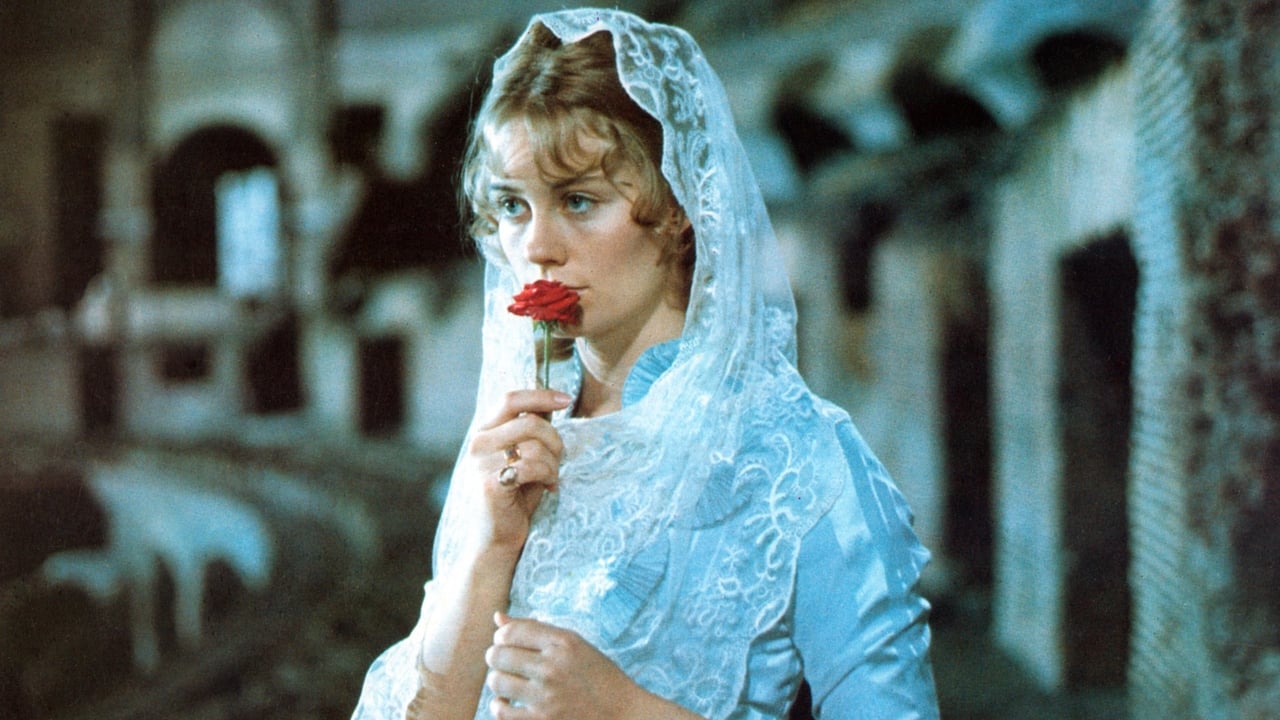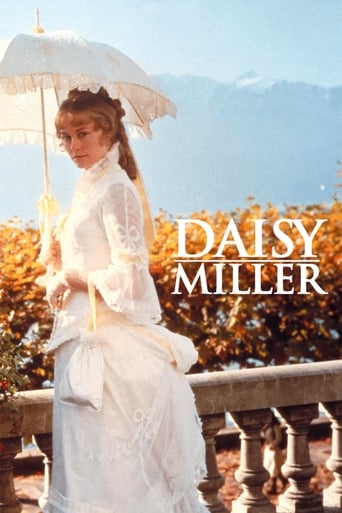

This Movie Can Only Be Described With One Word.
... View MorePretty good movie overall. First half was nothing special but it got better as it went along.
... View MoreThe film's masterful storytelling did its job. The message was clear. No need to overdo.
... View MoreBlistering performances.
... View MoreIt almost feels mean to criticise Cybill Shepherd for being so unsuitable for this role, as she is so miscast. She plays the Daisy of the title, and is dull. When we first meet her, she's a pretty, spoilt, self-obsessed tease, and that's it. 90 minutes later that's still it. Barry Brown (Frederick) is, unfortunately, equally dull and one-note. Frederick chases Daisy, she teases him, and repeat until the end credits. That's a tough watch - especially when you've seen Ms Shepherd do it before, more concisely. Mr Brown has few expressions which give a hint of anything inside him that we may care to know more about. This film needed stars, or, at least, compelling character actors. The boredom is relieved by occasional flashes of melodrama in Eileen Brennan's eyes (but even they become repetitive), and some lovely photography, but the whole is empty of story, character, history, social milieu; even the dialogue goes on too much and is either commonplace or flatly rendered. There are moments of interesting observation, but there are scant. I shall read the Henry James story on which the film is based and try to work out what it was that the makers of this vacant film were striving for.
... View MoreTranslating the Henry James novella "Daisy Miller" into a movie was difficult,owing to an insubstantial story line. However, Peter Bogdanovich had it fleshed out considerably to showcase Cybill Shepherd (who was woefully miscast in the role.)Instead, Bogdanovich unwittingly memorialized another, much more talented performer for posterity.The movie begins in the hallway of a Swiss resort hotel, circa 1880. A rank of freshly-blackened boots and shoes stand just outside each door. A small boy, Randolph Miller (James McMurtry) retrieves his boots, leaves his apartment, and after stealing a walking stick downstairs, saunters outside, demanding a lump of sugar from the languid, yet congenial Frederick Winterbourne (Barry Brown) who is trying to read a newspaper.Frederick then falls into conversation with a young, garrulous woman, Daisy Miller, the young boy's sister (Cybill Shepherd), and agrees to accompany her to visit a castle, the Chillion.In a surrealistic scene, where Frederick and his aunt, Mrs. Costello (Mildred Natwick) are drinking tea (fully dressed, in a public bath in water up to their chests), Mrs. Costello warns her nephew away from involvement with the vulgar, nouveau riche Miller menage (daughter, son, and mother.)That evening, Winterbourne meets Daisy and her mother during a walk, and Daisy tries to wheedle an evening boat ride with Winterbourne, but is dissuaded by the family courier, Eugenio.The next day, Winterbourne takes Daisy to the castle and attempts to tell her its history, but Daisy is unimpressed and instead, chides Frederick about his older mistress in Geneva. She does, however, extract a promise from him to visit them in Italy next year.While in Rome with his aunt, Frederick Winterbourne attends a party hosted by a Mrs. Walker, a sardonic woman who enlightens Winterbourne about the gossip swirling around Daisy. Daisy has taken up with a local adventurer, Giovanelli, thus adding fuel to the scandal.Mrs. Walker tries to get Frederick to stop Daisy from parading around publicly with Giovanelli, but Daisy refuses, and Frederick (witnessing the two kissing behind Daisy's parasol) - storms off, enraged.When Daisy brings Giovanelli to a party of Mrs. Walker's and persuades him to sing, Mrs. Walker thinks Daisy is presumptuous and cuts her cold.In a rented hotel room (where Giovanelli and Daisy are practicing songs on a grand piano), Daisy torments Frederick by telling him that she and Giovanelli are engaged.Afterward, riding at nighttime in a friend's carriage, a morose Frederick disembarks at the ruins of the Colosseum. Hearing laughter, he follows the sound and finds Giovanelli and Daisy, chatting. Winterbourne upbraids Giovanelli for exposing Daisy to the malarial night air, then leaves, feeling betrayed.However, during an opera performance Winterbourne is told that Daisy has contracted malaria and rushes to her side, where he learns from her mother that Daisy was not engaged to Giovanelli (who has deserted Daisy), but was trying to make Frederick (for whom she actually cared) jealous.As Frederick is bringing Daisy a bouquet of flowers he learns the tragic news: Daisy has died.At Daisy's grave site are Daisy's mother, her brother, Mrs. Walker, Eugenio, Frederick, and belatedly, Giovanelli (who tells the heart-stricken Frederick that "Daisy was an innocent girl", thus confuting all the lies surrounding her.)The others leave the grave site except Frederick, who stands there, wraith-like, as the mists envelop him...As Daisy Miller, Cybill Shepherd was the wrong choice: too old, and no natural spark, or empathy connecting the characters of Winterbourne and Daisy. Ms. shepherd chattered her lines as though running the four-minute mile, and her delivery was by rote, without the vibrancy necessary for a convincing performance.Modeling is Ms. Shepherd's métier; acting isn't.Performances by such professional actresses as Mildred Natwick and Eileen Brennan were excellent. Ms. Natwick was convincing as Frederick Winterbourne's stuffy, socially correct aunt, and Eileen Brennan was delightfully feline as she unsheathed her claws over the faux pas of the outrageous Daisy Miller.Duilio Del Prete (Giovanelli) provided comic relief as the ingratiating adventurer, and James McMurtry (Randolph) makes childlessness look inviting.The real kudos, however, belong to the actor who actually carried the movie, and who, in the past, has been unjustifiably blamed for its failure. I am referring to the late, incomparable Barry Brown.Barry brown was a phenomenal screen presence, and if he had lived when Hollywood was still king, he would have become a screen legend. (An early, tragic death cut a promising career short.)Barry Brown was extremely handsome, charismatic, and intellectual. his large, lambent dark-brown eyes in his highly expressive face were capable of conveying a multiplicity of emotions throughout the movie, ranging from pleasantness through anguish, all the way to dark, smoldering hatred.In fact, prior to the filming of "Daisy Miller", Brown sent the producer, Peter Bogdanovich a five-page précis of his own impressions and psychological insights into the James novella.To explicate his upcoming interpretation of the Winterbourne role, Brown contrasted French vs. German formalism, citing Immanuel Kant's "The Critique of Pure Reason" to substantiate his argument. In other words, Barry Brown was an actor who could both act - and think.However, there was apparently a "falling out" on the set, and the failure of the film consigned Barry Brown to the purgatory of "box office poison."As acting jobs became fewer, Brown fell deeper into alcoholism and depression, and ultimately, this sensitive troubled young man committed suicide in 1978, at the age of 27.This motion picture may have been called "Daisy Miller", but Barry Brown's acting ability was its most valuable asset. If you watch "Daisy MIller" for one reason only, watch it for Barry Brown's compelling performance as Frederick Forsyth Winterbourne.
... View MoreDaisy Miller became a sabotage job by the very inclusion and insistence of Cybil Shepard as Daisy. As maybe the choice of Cloris Leachman as her mother proves to be eccentric if not slightly erroneous, there is nothing more damning to what could have been a wonderful literary adaptation. Peter Bogdonavich often does not know how to do his job, that is direct. I offer the example of Cher's repeated refusal and head butting against his, to turn her tour-de-force as Rocky Denis' mother in "Mask", to a simpering, gutless wonder. Man was he wrong then as he was wrong with this picture in particular. The religious adherence to accuracy hampers the actors and the film's own creativity and prevents any beefing up where it would have greatly paid to do so. I ,in instance, refer to the brilliantly talented actor Barry Brown as Winterbourne. He's the romantic male lead but is practically made a eunuch in this film, no doubt because Pete was serenading the starlet with his camera all for himself, that no amount of screen ability could have facilitated Barry to have cut into what was obviously a three's a crowd. His scenes with REAL ACTRESSES, Eileen Brennan and Mildred Natwick, display different sides to his character's character and he does this beautifully; the sharp fine line of snobbery, dutiful nephew, and feckless Continental anti-hero. He is all the while completely believable and damned likable, practically the only heart in the whole cadre of performances. Eileen Brennan is wonderful as cold but not without caring as she fusses over Daisy's refusals at propriety and of course, Mildred Natwick is a feast to watch, as one flicker of her face is meant to speak volumes. I watch it for Barry who deserved a thousand times better than this and Ms. Brennan and Ms. Natwick and ignore Cybil as best I can. I recommend for anyone to do the same.
... View MoreI agree with the above comments. Miss Shepherd's simpering performance sabotaged what was otherwise a very good film. Subtle, amusing in all the right places and well-directed by Peter Bogdanovich. Unfortunately Bogdanovich was so taken with Cybill Shepherd he failed to see that she was wrong for the part. She is outshone by a brilliant supporting cast including Cloris Leachman as the weak-willed mother and Eileen Brennan as a spiteful society woman. Henry James has never transferred well to the screen; one thinks of the disastrous "Portrait Of A Lady" where Nicole Kidman was colourless as Isabel Archer. This is about the best of the movies adapted from James (perhaps with the exception of "The Heiress" which was an adaptation of "Washington Square") and it benefits from its' sumptuous location photography - it was filmed in Switzerland and Rome.
... View More